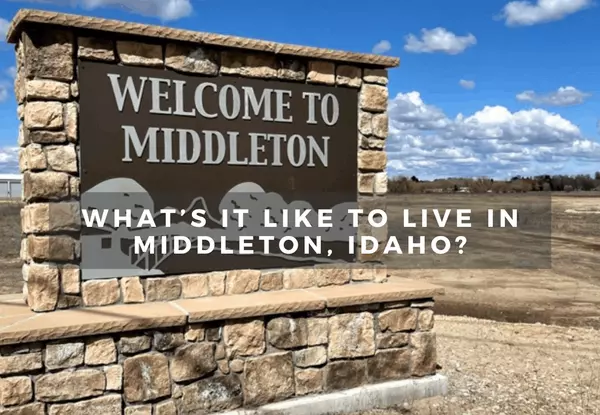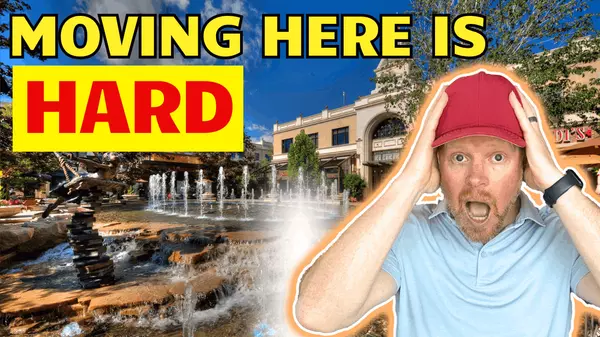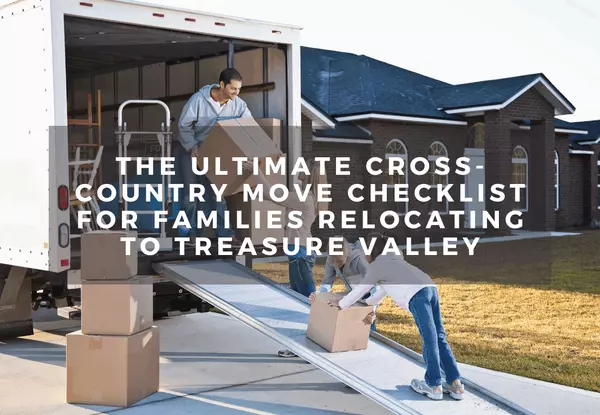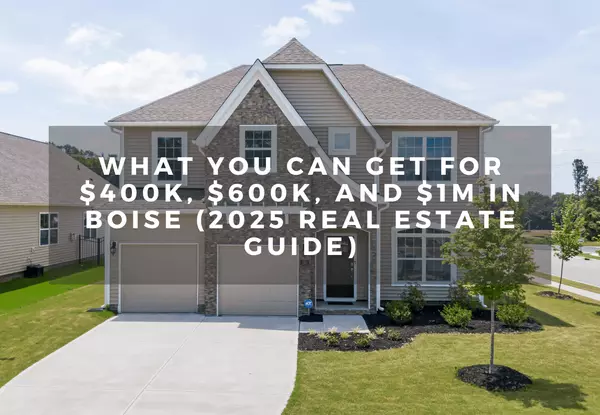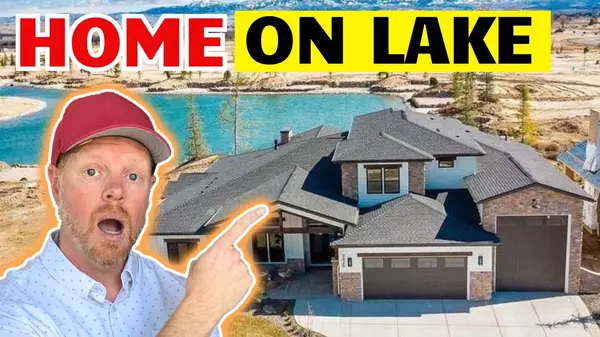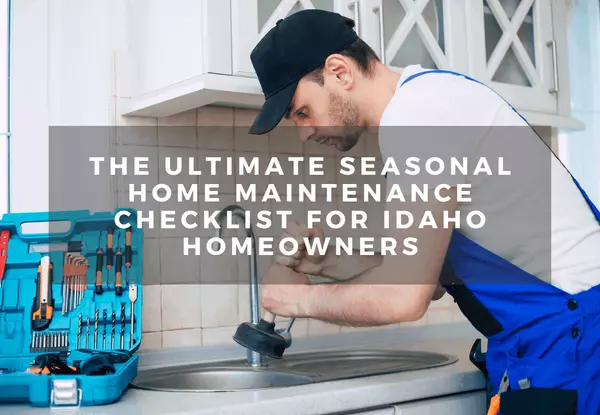The Pros and Cons of Buying a New Construction Home in Boise Idaho
You're looking at buying a new construction home here in the Boise Treasure Valley area. And you want to know the pros and cons and everything you need to know before you pull the trigger on buying that new build. I'm here to share with you my experience so you don't get caught making the same mistakes that a lot of people make when buying a new construction here in Treasure Valley, and we're getting after it right now.
There's a lot of benefits to buying new construction over resale, but there's drawbacks as well. And you need to know what those are.
Pros and Cons of New Construction in Treasure Valley Area
First off you've got Boise and everyone thinks of Boise when they move in here. Well, frankly, a lot of people don't actually move to the city of Boise itself. Boise is the capital, the largest city here in Idaho. But a lot of people, especially when they're looking at new builds are actually moving to the suburbs of Boise.
These are all individual cities surrounding Boise, such as Eagle, Star, Middleton, Caldwell, Nampa, Meridian, and Kuna. Those are the big areas that people are moving to. And that's where most of the new construction actually is, especially in little bit of Eagle, but Star, Middleton, Nampa Caldwell and Kuna. Those are blowing up with new construction.
Meridians kind of built out, but you can still get it. And I'm talking brand new construction where you're buying from the builder. There's a lot of homes you can get that are for resale that are only a couple of years old because people have to move and relocate for various reasons. You can still find fairly new construction that isn't exactly brand new, new built off the builder.
And there's actually some benefits to going after that versus doing new construction.
We're going to dive into all those things right now.
Cons of Why People Buy New Construction Homes
Con#1 Landscaping and Fencing
The first one up is, when you're buying new construction, just from right from a builder, they may or may not include landscaping and fencing in the contract. Oftentimes they are going to provide landscaping out front. They want the community to look beautiful. They want it to be consistent with the whole neighborhood. That's why they have the HOA.
But they may not do landscaping in the back. Most likely they won't, unless you're getting a fully customized home or the builder allows you to do some upgrades along the way, such as landscaping. If they don't provide fencing, the HOA is certainly going to require it. That's going to be an extra cost that you're going to have to come up with.
And sometimes the lower end builders won't provide that out of the gate, pun intended, but sometimes they will. Make sure you're looking out if they got fencing included, do they have any landscaping? Most likely the backyard will not be landscaped. It will just be a scraped dirt lot in the back.
Con#2 Hard Soil
The soil here is very hard because these homes are getting built in farmland. What they've done is they're going to scrape that good top soil off, cause they need to get down to good soil so they can build a good foundation for the homes, your house doesn't settle.
But unfortunately that strips all the nutrients out, all the bugs, all the good probiotics and bacteria that's in the soil and it's just rock hard. What happens is if you go and try to plant grass, right on top of that, it's going to die. You're going to have all these brown spots. It's going to be splotchy and your grass is just going to die.
Unfortunately you have to typically over excavate your soil and then bring in new soil on top for a top soil so that your plants and grass can actually latch on and have the nutrients they need to grow and thrive and survive and have a beautiful backyard. That's an added expense just between landscaping, depending on what you want to do, and then having to excavate and add in your top soil.
And because it's so hard, you also are going to have the tendency for water to kind of run off your property. Maybe if it's not sloped properly, which it should be away from your home, it can go into your home, into the crawl space. You've got to make sure that it's sloped away properly when you're doing your in-home inspection, but because you can have all this running water on top of your landscaping, it can then have a tendency to pool.
That's the other thing you got to look out for. And most likely either the builder have them do it, or you got to do it, after the fact, is install a French drain. A French drain is essentially a hole that's drilled or dug down through that hard top layer into the sand layer beneath that. And then that's filled up with coarse gravel, like three quarter inch aggregate, and then a little area drain on top.
And that allows the water to hit that drain, filter down through the gravel and then hit the sand layer and escape from your property. That's how you have to handle the hard top soil on these new builds. Those are all things that you just may not be aware of when you're buying a new build.
You're looking at these model homes and they're all perfectly landscaped and beautiful. And then you actually have to come out of pocket for all this stuff. And this stuff you just may not have been aware of it.
The other thing too is some of these builds, especially again, in the more tracked home type builds, they're just going to drop in a little 10x10 concrete patio for you, you have a little 10x10 pad when you walk out your patio, that's it. That's all you got and you get your dirt lot.
I don't know about you, but I like to have much more concrete. When you're entertaining hen you want to have a nice concrete surface for people to walk around on, put your chairs, your fire pit, all that kind of stuff. I got a solo stove I like to put outside. I just like to have it on a nice concrete surface.
That's usually an added expense too. If you want to add a lot of concrete, that's going to cost you tens of thousands of dollars, depending on how much concrete you want to actually pull it in. That's kind of a little bit of a bummer that you got to look out for when buying a new construction.
Con #3 Water
And before we leave the exterior completely, let's talk about water. Real quick, you're going to have an HOA and a new construction, and you want to try to find out if that new build or the HOA includes water in your HOA fees. It's not going to include your interior water, your faucets, your drinking water, and showers, but oftentimes it can include exterior water for landscaping cause they want you to keep your exterior beautiful.
You want to try to make sure that you've got that included, but they don't. That's a big con cause it can get expensive. You can certainly spend hundreds of dollars a month keeping everything watered. But because they want the front landscape, sometimes, even if they don't include complete exterior water, they will include front water.
I have water that's on a meter for the HOA just for the front, not for the back. A trick that I've heard some people do is buy a long hose, like 150 foot hose tap into the water in the front. They got faucet, you got spigots out there and run that to the back. Boom. Now you've got your backyard watering covered by the HOA.
#Con 4 Appliances
Let's head inside a little bit and take a look at a few things that you may not be aware of that are not going to be included. That's typically going to be your appliances. You'll have a range of course, but you won't have a refrigerator and you won't have a washer and dryer. Those are added expenses if you don't already have them that you're going to have to pick up.
That's not necessarily terrible. It gives you an opportunity to buy a brand new one and everything's nice and brand new that you get to select exactly what you want, but you know, a lot of resale homes, oftentimes that's included. It's just another extra expense that you may not have been looking for.
Con# 5 Blinds
The other thing interior wise is blinds. You're going to have no interior blinds, typically. Now again, on these custom homes, you can probably, you can add that in, but your typical tract homes, spec homes, even semi-custom homes, you're typically going to have to buy your own blinds.
You get to select what you want, but be prepared to shell out $1,500-$5,000 depending on the level of blind quality that you're looking for.
Con#6 Vents
Another kind of odd thing that I've noticed in a lot of lower end builders versus the custom homes is they have these vents that are installed in between the hallway and the bedroom. What that is, it's above the doorway. And what it is, it's actually a return air vent for the air conditioning heating system.
Instead of installing a return air vent in every single room, it's basically like a lazy man's way or a cheap way of installing a return air system. Heating and air conditioning needs supply air, and it needs return air in order to function properly. What you often see as a return air in the main living areas and the master bedroom, but you won't see it in the other bedrooms and laundry room.
You'll have this hole with the vent that's just a pass through. And what it is, is that's allowing the system to balance and they don't have to install duct work specifically for each room with a return air. It's a much cheaper way, but obviously now you've got this kind of unsightly event, but more importantly, it allows sound much more sound to pass through the walls. If you're like me and I've got kids and they got to take naps and you just have a lot more sound that's traveling through the house.
And if you go ahead and block them up, it messes up the balance of the system and you're going to have inconsistent heating and cooling. Room might be colder or hotter than the rest of the home, depending on the time of year and how that system is functioning.
Overall, what you're going to find too in these homes is that, especially if you're buying from a home builder like CBH, Hubble Home or Hayden Homes, you're really not going to have a whole lot of opportunities to upgrade the home. You might, especially if the home has not been built yet, it's a future build home or a to be built home. Or as they call it a pre-sold home, meaning they haven't built it yet. They call it a pre-sold home.
You can have more opportunities to upgrade your home. Selecting countertops, selecting carpets and flooring, that kind of thing, maybe doing your landscaping, but generally speaking, you're not going to have a lot of upgrade options. You're kind of stuck with what they're going to give you, and that can be okay, but you can't upgrade it.
If they do allow you to upgrade, it gets really costly. A friend of mine, he just bought a Hubble home. His first one was a spec house, no upgrades a lot at all. His second one was a pre-sold home. He kept his first one, he's renting it out. He loves the Hubble homes and he did a lot of upgrades, but that caused a lot more expense and a lot more delays in order to get all those upgrades done.
And what you're going to get in a lot of these homes is pretty basic as far as the type of building materials. And I'm going to dive into that a little bit more when I get into the CBH and Humble Homes so we can dive in a little bit more about that because people want to know why are those so cheap? And we're going to cover exactly why that is.
Con #7 Off Gassing Homes
The last thing to keep in mind, it's not really a con per se. It's just something you need to be aware of is that these homes, because they're brand new, they do off gas, especially inside. They've been closed up and they've got materials in there, like the carpet, paint, the LVP flooring, any sort of glues that might be in the Formica countertops or the carpets, those are going to off gas. And those are the VOCs that are escaping, is normal, but the house might smell plus it just exposing yourself to more chemicals.
Because this home has been closed up for a while, what you want to do is open the house up, open all the windows, put some fans in there and air it out for a day or two. You can even run some diffusers like eucalyptus and lemon, that's going to help to absorb that and dissipate that. Just keep that in mind that these homes do off gas, that's normal and just open it up and you'll be good.
Con#8 Contracts
These last couple of cons are more about the contract and they are about the actual home. The first thing you need to know is that most likely if the home does not appraise at the purchase price, then the way that these contracts are typically written are that you have to come out of pocket for the difference.
You're not using the standard Idaho real estate offer contract or using the builders contract. We can negotiate that stuff up front and try to clarify it. But sometimes that can happen. Right now, where the way the market is with balancing out, but it's really not an issue, but that can have. That was kind of more of an issue before when the market was rapidly appreciating.
You just got to be aware of that. That potentially you could be on the hook for the difference in the appraised value and the purchase price. But right now the bouncing market is not such a big deal, but you need to watch out for that.
The other thing too is it's difficult to pull out of these contracts so they will require an earnest money deposit. That's like an initial deposit to secure the home. And oftentimes it can actually not be a whole lot of money. Like when I bought my home from Hubble, it was only $2,000.
However, if you want to pull out what they get you for is liquidated damages. Liquidated damages has nothing to do with water or water damage. It is as the contract term, that's called liquidated damages that is basically saying for you harming the other party by pulling out, you're required to pay them damages, a fee,1 in order to pull out on top of your earnest money deposit.
You're going to lose your earnest money deposit, most likely because these homes, these contracts are written in such a way you don't have financing contingency. With the changing market, this could change as well, but this is how it's been for a while here in Idaho. And you're going to lose your earnest money deposit, which could be a few thousand dollars.
And then they're going to hit you with for liquidated damages. And that could vary. But for instance, the Hubble contract is written with a $5,000 liquidated damages. You might be in for $2,000-$5,000 earnest money deposit, and then get hit with liquidate damages on top of that at $5,000, if you decide to pull out for whatever reason, cause you couldn't get your loan and you did an appraise and you don't want to pay the difference.
Or you decided you don't want that home anymore and you want to go buy another home. They can come after you for that. It does go to arbitration. It's a whole process and thing, but potentially you could lose $7,000-$10,000 because of the way that these contracts are written.
Pros of Why People Buy New Construction Homes
Pro#1 Scheduling of Your Move
The first thing that was a big importance for me in terms of just planning to move here. I'm a big time planner. I want to know everything down to the last detail is the scheduling of your move.
Because you can purchase a home in advance before it's completed, you can actually schedule when you plan to move. I scheduled my move about 4-5 months before I moved out here. And I knew that within a short time window, that I would be able to move into my house.
There are delays that occur, especially with all the supply chain issues we've been having. But in my case, it actually was delivered on time within that window. When we first went over contract, they gave me a one month window. And then when we actually signed all the paperwork, it had shifted a week out.
I just got an Airbnb for 7 weeks. I got up here early, got to know the area and I gave myself a couple extra weeks on the back end so that I could have time to allow them to have some delays and then get myself moved in. I really liked that from a scheduling standpoint, assuming the builder is able to meet their schedule.
What they told me, which ended up being true is that once they got countertops installed, they knew exactly when they'd be able to complete the build. That was the big driving point for them because that counterpoints are a very long lead item. It can take months to get them. Once they're onsite and installed, they know that like clockwork, everything else is going to go. That's something to keep in mind is the scheduling aspect. I love that from a planning perspective.
Pro#2 Brand New Home
The other thing of course is you're buying a brand new home. No one's ever lived in it. The systems are brand new, your air conditioning, your furnaces, your roof, your flooring, there's no wear and tear on it yet. It has a long life, you're not going to have a lot of unanticipated costs. You have a little maintenance because of that. And you can really budget a lot better in terms of your ongoing maintenance costs.
You can save money for when those needs do ultimately break, but you've got 10-15 years on that air conditioning and furnace, at least. Your water heater, maybe even more, 20-30 on your roof, your flooring, depending on when you want to replace it, you've got years on that.
I really love the fact that it's like a brand new car, right? I like to buy a brand new car because I know I will take care of it. I know how to maintain my car. And I want a brand new car. I know exactly, what has been involved with that vehicle. And it's kind of like that with a house you're getting the same thing. It's a brand new car, brand new house that no one's lived in, no one's messed with it.
You're going to maintain it properly. You don't know what that other person did. They probably did not maintain their air conditioner and heater properly. I really love that from getting a brand new house, low maintenance costs because of the systems that are brand new. That is a big, big reason why people like to buy a new construction home.
Pro#3 Warranty
You've got your warranty that a builder is going to offer. Every builder is going to offer a different type of warranty. You got to check exactly what that is. But Hubble Homes, for instance, they're going to offer a 1 year warranty on materials and workmanship and the major systems. I wish they would offer a longer frankly, but that's what they do.
But they do offer a 6 year warranty on the structural components of the home. Your house ain't going to fall down and they're going to warranty that that's great. CBH also offers a really fantastic warranty as well, and all the builders have a warranty. You get that peace of mind that if something's going to break in the first year or maybe for several years, it's going to get fixed.
Pro#4 Modern Floor Plans
Because these homes are brand new, they're also designed with modern aesthetics and layout. You've got big wide open floor plans, a lot of windows, a lot of light, the homes, aren't all chopped up. They're not dark and they're large. People want larger homes these days, let's face it. That's a really big aspects to getting these new modern homes is you have these beautiful layouts and floor plans, and they're also move in ready.
You might have bought them in advance, so it might be 4-5 months, but once it's delivered, it's move in ready or the home might be complete and you can just go buy it and move in. As soon as escrow closes. That's an awesome feature of buying these new construction homes. You don't have to wait for someone to move out and then they bang up the walls or other furniture and you got to go fix it all. And it's done. It's just moving ready.
Pro#5 Blank Slate
It's a blank slate. You're getting a blank slate of a home to do with it, what you want.
You got neutral colors and you can paint the walls. The bright, crazy colors you want to do if you want, if you're into that.
But you can do whatever you want with a home and you can make any changes to it as well. Of course, you got the landscaping. I talked about that, unfortunately, isn't going to done, but you do with it exactly what you want. Design your dream backyard.
Pro#6 Energy Efficient Homes
And you're also getting energy efficient homes. These homes that are being built right now are super energy efficient. That's going to drive down your heating and air conditioning costs and just keep you more comfortable overall.
And a lot of the homes also now are smart homes where you can control the lighting and the air conditioning, the heating remotely as well, or put them on timers. That's an awesome feature for a lot of new builds as well.
Pro#7 New Communities
They're just beautifully designed and laid out. And depending on what community you're going into, they're going to have modern community rooms, beautiful pools, clubhouses, tennis courts, big playgrounds, that kind of thing.
That's you're paying for your HOA, but they're just modern and brand new and nicely designed. Those are features you're going to get in these brand new construction homes.
Pro#8 First Come First Serve
And finally, they also are a great option if you're getting locked into bidding wars in a rapidly appreciating hot sellers market, the new construction homes are first come first serve. Oftentimes you can get in without having to get into a bidding war.
In fact, that's actually what I ended up doing it because I just didn't want to deal with it. And we just went ahead and bought one off the shelf, so to speak, and we were quite happy with it. That may not be for you and in a declining market, we're in a shifting market right now.
That's not really the case right now, where as far as the bidding wars, you do have more options on the resale side. But if you are in a very hot sellers market, then no bidding wars is a great way to go with a new construction home.
We'll look at a couple of things that could go either way, depending on how you look at things.
Not Established Neighborhoods
The trees, you're really going to notice this when you drive through a established neighborhoods that have been there for 15, 20, 40 years, you're going to have very large trees and tree lined streets. They're nice and green in the spring and summer, and then you've got the changing fall leaves in the fall.
And then of course they're dead in the winter but in the new construction communities, you're going to have a lot of very small trees that were just planted.
And it's going to take awhile for those to grow up. It's going to take 10, 15, 20 years to grow into that established neighborhood.
Unfortunately, you're not going to have beautiful tree lined streets. You don't have a whole bunch of houses with little tiny trees in front of them. I guess the advantage to that is you have fewer leaves to deal with that. You don't have to sweep up as much to got to do it. You're going to have tons of leaves. You're not going to have pollen from the trees or sap dripping off the trees.
When I first moved here in the Airbnb I was in, I have this tree that I had to park under. A two trees, actually, one was loaded with sap that just constantly dripped all over my truck. And then the other side was dripping like these little, it wasn't a pine tree, but it was just drip these little balls, it's these little pine cone type things all over my truck. And then they would stick to it cause it had the sap from the other tree.
I'd drive down the freeway and these little pine veins would just sit on my truck and they wouldn't come off. They knocked off easily but I had to wash my truck every few days just cause it got so dirty from all the sap and pollen and that would just fall all over my truck.
That's kind of a bummer but you're not going to have that in new construction homes because the trees are not nearly as grown up.
The other thing that could go either way is if you're buying in a seller's market or in a shifting/ buyer's market. If you purchase in a seller's market where the market is appreciating rapidly and you lock in a price down here, but the market's appreciating and all of a sudden it's up here at a higher price by the time you purchased, you have built in equity right there, right?
If you buy it $500,000 and the market goes to $600,000, you have $100,000 of equity. It can work in reverse of course, if you purchase here and then the market goes down, now you're kind of underwater right out of the gate. And this goes back to potentially lose the earnest money deposits, liquidated damages. If you choose to pull out.
Right now when I'm writing this blog, we are certainly in a shifting market. Housing prices are dropping actually right now, I chose to buy in that market. I don't know, maybe I'm crazy, but here's why I decided to buy it. And then we'll get into some benefits of this too. But I looked at it as, "would I be happy" buying this house in 10 years? When I look back 10 years from now and say, I'm happy that I bought that house.
And I said, "yes", I believe in real estate as a long-term wealth building strategy. And I believe in real estate. I do believe that in 10 years I would look back. Even if my house dropped in value, I know it's going to come up and rise in value overall. And I don't plan on selling this house. I'm just going to rent it out and keep building wealth that way, buy another home and so on and so forth.
That is a great long-term wealth building strategy. I don't really care so much that it's going to go down. Of course, I'm going to hedge my bets and I negotiated a pretty sizeable price reduction and the credit as well in order to compensate for that and made me feel much more comfortable about buying in a softening market.
And that's the thing right now, builders are actually offering some price reductions, but the big thing are credits. Toll Brothers right now, they've got a promotion where they're offering interest rates at around 4% on a 30-year conventional mortgage. And you've got Hubble Homes that's offering $20,000 move-in credits on to be built homes. CBA is offering me $20,000 - $30,000 in credits as well.
They're playing ball. They understand what's going on. They want to sell these homes. They don't want to get stuck with them. There's certainly a buyer's market going on right now. I want to call it a full full blown buyer's market, but it's certainly there. You're going to be able to negotiate some good credits right out of the gate. You're not going to negotiate price reductions.
The builders do kind of set their prices and that's what it is until they drop them. That's just kind of how it works. Either they raise them and appreciate a market or they drop. They don't really negotiate. They will negotiate over credits. But a lot of times they have these kind of standard programs. They're like, "well, you can get this with this credit, do you want it or not"? That's kind of how the negotiations tend to go with the builders.
The other factor to keep in mind too, when you are buying new construction and you're buying 6 months in advance is your mortgage rate. Again, builders are offering discounts right now on that, they're offering long-term rate locks. Like I mentioned, Toll Brothers, they're offering a long-term rate lock for free.
But if they're not offering that, or if the market is a stronger market, you're going to have to pay a rate lock fee to rate lock. I was able to rate lock for 5 months at, I think it cost me like $2,500. It wasn't bad at all. And that got actually applied to the down payment as well to the closing cost. There might be some upfront costs that you might lose if you back out but you do have to factor in getting a rate locks. You'd locked in your rate so it doesn't go up over time.
Let's dive into a few just kind of things you should be aware of when you're buying a new home as well, is the importance of getting an inspection. Some of these builders are, they might kind of discourage you from getting an inspection. In fact, if you go on like CBH's website, there's a document there that says, "Hey, before you spend $500 on an inspection and waste your money, we want to make sure we tell you all the things that we do in order to prep the home and sell it. We've pre-inspected it and here's what we'll fix. And here's what we won't fix". They're going to try to scare you off from doing it.
Hubble Homes, for instance, they don't come out and say that. But they'd say, "if you get a third-party inspection and ask for repairs, it might delay the closing date". They kind of try to throw you off like, "oh, I just want to close on time and I want to get to my home, so I'll just skip the inspection". Don't do that. It's so important to have a third-party inspector come in to look at the home.
They're going to go through everything and find out if the builder actually built this home correctly. The inspectors here know how to inspect new construction homes and what to look for. For instance, on the home that I am buying, we've found some structural items. There was actually a gusset plate in the roof trust framing that was missing. And one of the framing members with popping out. It's a brand new home.
We also found mold in the crawl space. We found a little bit of black mold on a couple of members. And that kind of worried me. My daughter actually we've been going through basically detoxing her a bowl because she had mold exposure in a prior home that we were in. And so we're like, oh gosh, mold, but you know, what's going on? It is very easily treatable. It was a small amount of mold. The builder came in and did a remediation to get rid of it.
What happened is, before they actually closed it up, obviously some moisture got in there and this is a conditioned crawl space. There's no ventilation. And it's kind of weird how it works, but it draws an air from the house and then ventilates it out, to condition the home. It's using air from the house to condition. It helps with energy efficiency. We found mold and so they just didn't air it out properly before they completely sealed up that crawl space.
And then also we found the furnace wasn't working. I mean, it's a brand new home, the furnace wouldn't kick on. We got the AC to kick on first, but you know, the builders good for it. And they fix it all of course, but these are things if you didn't do a home inspection, you'd be stuck with. You never know. That $500 you're saving could cost you tens of thousands of dollars down the road.
As we dive into the different types of new construction homes that are available in the different communities, it's important first to keep in mind that what is shown on the MLS, meaning Zillow, Redfin, Realtor.com, all these portals, it actually may not actually be what is truly there. These builders like to just leave homes on the market that are actually already under contract. Their lead magnets, their ways to get consumers information to bring them in to them directly so that they can sell them a home direct.
A lot of times that home is not actually available, but they often times have many more homes that actually are. They kind of pick basically model homes like "Hey, these are indicative of a bunch of different homes we have. That home might be under contract, but we've got these ones over here that are very similar and there's five of them available, which one do you want now?"
That's why it's so important to work with an agent who's staying in touch with the builders regularly to get updated lists, to find out what actually is available. You don't get your change jerked around that much.
Types of Communities
Tract Home Homes
These are going to be kind of your more basic entry-level type homes. Those could have true starter homes. It might be 1,300-1,000 sq ft, single story, and then ranging the 2,000 sq ft, 4 bedrooms, a kind of still starter home. They're not going to have an extra living room upstairs.
Still kind of on a starter home to the larger move up homes for larger families that are in the 2,500 to 3,000 sq ft range. You're going to find all these within these tract home development. These are going to be built primarily by CBH, Hubble Homes and Hayden homes.
And CBH is by far the major builder. They've been around for about 30 years now. And they have built many of the homes here in the Treasure Valley. Most likely when you're going into a home in this price range and the starter kind of starter home tract home price range is probably going to be a CBH home. Or if it's on the newer side, newer construction then it potentially could be Hubble or Hayden.
They are more affordable homes. These homes are going to range in price anywhere from about $400,000-$600,000. Why is that? You know, one reason of course is that they're smaller lots. You're going to have nice size home, but a smaller lot. And you're going to have about 7,000-10,000 sq ft. 10,000 sq ft is not bad. You get a fair matter or even 8,000 sq ft isn't bad. You're going to have a pretty big backyard.
But you're certainly not going to be into the half acre type homes. You're going to have smaller lots. The communities themselves are going to have fewer green spaces. They're going to have less amenities. They may not have a community pool. They may not have a clubhouse. They may have a smaller playground. A lot of them still have playgrounds for the kids, but you're just not going to have as many amenities as well.
The other big thing too, with these homes is frankly, they're just built more cheaply. They're going to use building materials and methods that are going to save them money, right? It's like what I talked about before those return air plenums for the air conditioning unit. They're not going to install the duct work all the way for each return so that's cheaper, but now you've got more sound issues in your home which is a pain.
These are definitely in a lot of the CBH and the Hubble homes, you're going to find that. They're also going to use as cheap as possible of building materials as well. Your carpet is going to be pretty cheap. Like our house we bought, I was really disappointed actually in the carpet selection, it was really bad at some of the cheapest carpets.
My wife's father is a floor covering contractor back in California. He was, not any longer. And so my wife has worked a lot with him installing flooring, and she was like, "this is the worst carpet I've ever seen", We've never installed something that's cheap. Like we would never put that in. That's a disappointment, it's going to wear out quickly.
Also the countertops. CBH in particular, you're going to get laminate countertops everywhere in the kitchen and the bathroom. It's going to be laminate for Mica, basically everywhere. Hubble Homes, you're probably going to get solid surface, potentially granite or manufactured stone in the kitchens, but you're going to get laminate in the bathrooms as well.
They're going to use cheaper materials to cut costs in order to make these homes cheaper. That's the fact they are cheaper homes and that's reflected in the purchase price.
Semi Custom Homes / Fully Custom Homes
As we move into these more planned developments, that might be a single developer that then piece it out to individual builders. They have an approved list of builders that can build in these communities. And these are going to be not tract homes. They could be a spec home or the builders like 'this is the home that I'm building'. And then they kind of speculate on selling it to you, but you're going to like that.
But typically they're going to be Semi Custom Homes or potentially Fully Custom Homes. And that's where you can get in and actually design what you really want. A semi custom home, it might already have a set floor plan, but they're going to allow you to come in and maybe change the front elevation or change the type of finishes that you're going to launch. Like, 'Hey, I want quartz countertops all throughout the home or in the kitchen or chords. And then I want granted the bathrooms.
I want this type of flooring. I want a really nice a Berber carpet'. You can have a lot more options there as well, and you can design your landscaping.
Or you can get into the full blown custom homes as well, where you're designing everything, you're designing the floor plan and everything else. Those are going to be very intensive. You're going to have so many selections and it's going to take awhile to design and ultimately build that of course, versus a semi-custom or attract home development.
And you're going to be spending a lot more money for that as well because you're going to be getting into all these custom finishes. Those homes tend to be more than that $800,000-$1 million plus price range. But also what's really cool is a lot of these are going to come with those RV bays or big workshops.
I think that's a great option for a lot of people. It's a great, great product. And you're going to find those, especially in areas like Caldwell, Nampa, Middleton, and Start. A little bit in Eagle. But those are really we're going to find those for the most part. If you're building a fully custom home anywhere, of course you can build that.
Single Builder
The other option too, is a single builder. A great example of this is Toll Brothers. They have a number of communities here in the Treasure Valley. This is a single builder that is the developer and the builder, and they're controlling the whole entire process start to finish with them as the builder.
These are going to be a combination of kind of tract homes and semi-custom homes. You're not going to get custom homes with them, but they do a fantastic job of delivery and a great product, but you are going to be paying a bit more. An equivalent home as a Toll Brothers home versus a CBH home, you're probably going to be spending a couple hundred thousand dollars more, but the quality is going to be a little bit better. Your finishes are going to be better. You're just getting a better product overall.
And the other thing to keep in mind is that the builder is going to try to get you to work directly with them because it saves them money because they don't have to pay us to help represent you to buy that house. And the thing is, is things come up that you want someone in your corner to help navigate the process for you to handle it, contracts and negotiations, handle the appraisals, handle the inspections, handle all the emotions that come along with buying a home.
Curtis Chism, Realtor
208-510-0427 | Mobile
boise@chismteam.com
Chism Team | NRDS# SP56593
brokered by eXp Realty
Categories
Recent Posts
